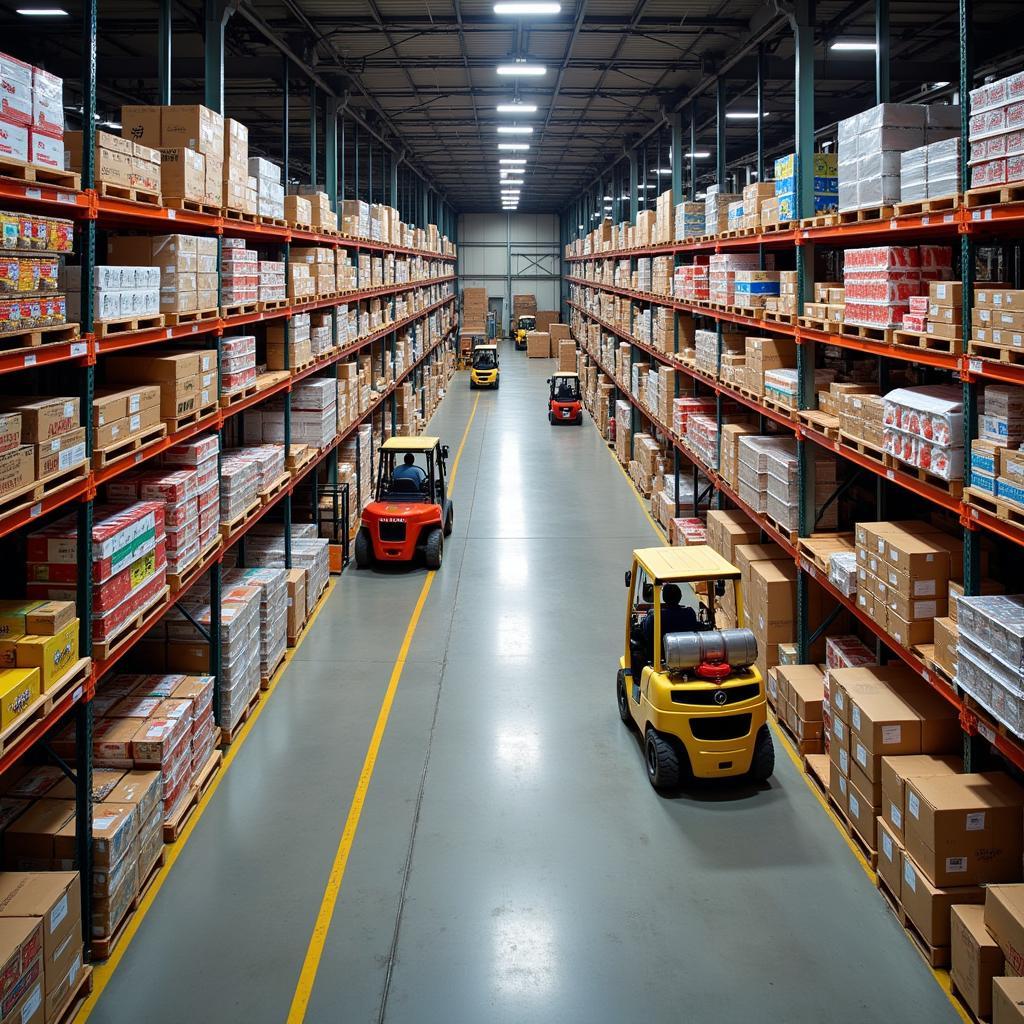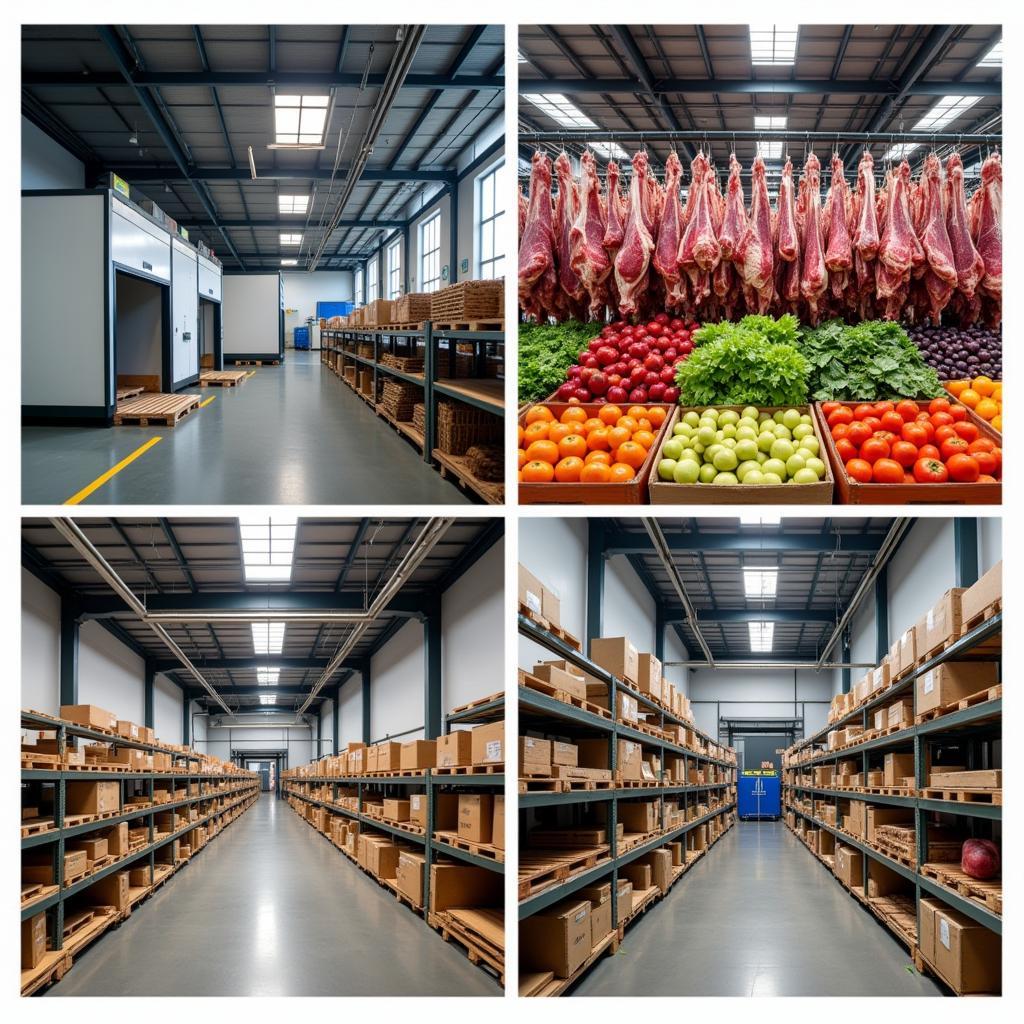The journey of food, from farm to fork, is a fascinating one. And a crucial, often overlooked, part of this journey is Food Warehousing. This intricate system ensures that food products are stored, managed, and delivered efficiently while maintaining optimal quality and safety standards. Whether you’re a seasoned food business owner or just starting, understanding food warehousing can be a game-changer for your operations.
 Food Warehouse Logistics and Operations
Food Warehouse Logistics and Operations
What Makes Food Warehousing Unique?
Unlike traditional warehousing, food warehousing operates under a unique set of rules and regulations. This distinction arises from the perishable nature of food and the stringent safety standards required to prevent spoilage and contamination.
- Temperature Control: Maintaining specific temperature zones is crucial. This is where terms like refrigerated warehousing, frozen storage, and climate-controlled environments come into play, each catering to different product needs.
- Inventory Management: First In, First Out (FIFO) is the golden rule in food warehousing. This method ensures that older products are shipped out first, minimizing waste due to spoilage.
- Hygiene and Sanitation: Strict adherence to sanitation protocols is non-negotiable. Regular cleaning, pest control measures, and employee hygiene practices are paramount to prevent contamination.
Delving into Different Types of Food Warehousing
 Various Types of Food Storage Facilities
Various Types of Food Storage Facilities
The type of food you need to store dictates the kind of warehousing you require. Let’s break down the most common types:
- Refrigerated Warehousing: Ideal for perishable goods like fruits, vegetables, dairy, and meat, requiring temperatures above freezing but below room temperature.
- Frozen Storage: Perfect for long-term preservation of items like meat, seafood, and frozen foods, demanding sub-zero temperatures.
- Dry Storage: Suitable for non-perishable items such as canned goods, grains, and packaged foods that can be stored at room temperature.
- Climate-Controlled Warehousing: Offers a customizable environment with controlled humidity and temperature levels, ideal for specialty items like coffee, chocolate, or certain types of produce.
Benefits of Partnering with a Food Warehousing Provider
For many businesses, especially startups and those experiencing rapid growth, outsourcing food warehousing offers a multitude of benefits:
- Cost-Effectiveness: Building and maintaining your own warehouse can be capital-intensive. Outsourcing eliminates these overhead costs, allowing you to allocate resources to core business functions.
- Scalability and Flexibility: As your business grows, so do your storage needs. Reputable warehousing providers offer flexible solutions that easily scale up or down to match your volume fluctuations.
- Reduced Risk: Food safety regulations are constantly evolving. Warehousing experts stay ahead of these changes, ensuring your products remain compliant, minimizing the risk of costly recalls or legal issues.
“Choosing the right food warehousing partner can be a game-changer,” says Sarah Thompson, a supply chain consultant with over 15 years of experience in the food industry. “You’re not just looking for storage space; you need a partner who understands your unique needs and can provide tailored solutions to optimize your supply chain.”
Choosing the Right Food Warehousing Partner: Key Considerations
Finding the right warehousing partner for your food business requires careful consideration. Here’s a checklist to guide you:
- Location and Accessibility: Proximity to your production facility or distribution channels minimizes transportation costs and delivery time.
- Facility Features and Technology: Modern warehouses equipped with advanced inventory management systems, automated handling processes, and real-time tracking capabilities can significantly enhance efficiency.
- Compliance and Certifications: Ensure the facility complies with all food safety regulations and holds relevant certifications like HACCP (Hazard Analysis and Critical Control Points).
- Experience and Reputation: Look for a provider with a proven track record in handling your specific type of food product.
- Customer Service and Support: Open communication and responsive customer service are essential for smooth operations.
Food Warehousing: A Vital Link in the Food Supply Chain
As consumers, we often take for granted the journey food takes to reach our plates. Food warehousing plays an invisible yet indispensable role in this journey, ensuring that products are stored safely and efficiently. By understanding the intricacies of food warehousing and partnering with the right provider, businesses can significantly optimize their supply chains, reduce costs, and ultimately, deliver high-quality food products to consumers.
For assistance in navigating the complexities of food warehousing or to discuss your specific needs, contact Mina Cones Food at Phone Number: 02437655121, Email: minacones@gmail.com. Our team of experts is available 24/7 to provide guidance and support. You can also visit us at 3PGH+8R9, ĐT70A, thôn Trung, Bắc Từ Liêm, Hà Nội, Việt Nam.